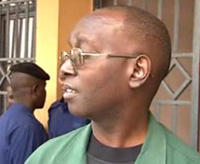“They like me in here,” editor Jean-Claude Kavumbagu said of his fellow prisoners. But sub-Saharan Africa’s only jailed online journalist still pays protection money to stay safe in Bujumbura’s Mpimba Prison.
The Net Press editor has been here since police arrested him on July 17. He was charged with treason over an article that questioned the competence of Burundi’s security services.
After much bureaucratic back-and-forth, the authorities allowed a CPJ delegation to meet with Kavumbagu, who was much thinner than he appears in his picture posted on Net Press. He was brought out to meet us in a yard in front of the main gate, where the prison’s governor sat at a wooden table under a tin roof shelter receiving petitions from visitors.
Kavumbagu, stooped and seeming much older than his 45 years, greeted the governor who motioned us to chairs at the foot of the prison wall, well out of his earshot.
Kavumbagu wore a clean green prison uniform and glasses. He spoke softly but became animated when talking about the government of President Pierre Nkurunziza that put him into this prison, built for 800 but now housing 3,500 inmates ranging from conmen to killers.
“I’m okay,” he said when asked about his health, although he looked frail. “I share a cell with a man accused of robbery and we get along.”
As a journalist among common criminals he’s something of a celebrity and not harassed. But he does pay the equivalent of several dollars a week for protection. “There are people in here who go crazy on drugs,” he said. He has access to radio and books. “Newspapers are a different story. I think the guards think they are political tracts and keep them from me.”
Asked why he has been repeatedly refused bail and is being treated as a criminal for publishing an opinion piece, Kavumbagu says it’s payback for a decade of criticism of the former Hutu rebels who now make up the government. Net Press, launched in 1999, referred to the rebels as “genocidal terrorists” for their treatment of minority Tutsi civilians during the civil war that finally reached a ceasefire agreement in 2003.
“My case is completely political,” he said, adding that the article criticizing the army was just a pretext to silence him. “This is their revenge,” he said.
Five consecutive governments have arrested him for his reporting. “Arbitrary arrests must stop. This is my fifth time but I have never been convicted.”
Kavumbagu said the only way he would leave Mpimba was through international pressure on the government. “The judiciary is not independent,” he said. “The international community must exert pressure on the government and the head of state to change this country.”
If convicted of treason, Kavumbagu could face life imprisonment. No date has been set for his trial.
He brightened visibly when asked about his news site.
“It’s still going,” he said, thanks to a small editorial staff of six. Net Press is tiny but influential, reaching the French-speaking elite here and the Burundian diaspora. “We get about 800 visitors a day,” he said proudly.
Kavumbagu said he was buoyed by international support and by the solidarity shown by his colleagues in the Burundian media. My message to them is: “Do not give in to fear.”
(Reporting from Bujumbura)
